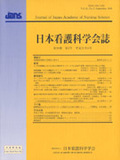Japanese
English
- 販売していません
- Abstract 文献概要
- 参考文献 Reference
要旨
目的:本研究は,体内水分量の観点から,体内水分量に影響を与える因子について検討し,病的多飲水の一因を探ることを目的とした.
方法:精神科病院入院中の統合失調症男性患者に,生体インピーダンス法(BIS法)を用いて体内水分量を測定し,病的多飲水患者(多飲群)35名,非多飲水患者(非多飲群)23名を比較対象とした.体内水分データと体内水分量に影響を与えると考えられる因子である,血漿浸透圧,尿比重,年齢,病歴,抗精神病薬投与量,抗コリン薬投与量,口渇感,喫煙量,多飲行動の有無,水中毒のエピソードについて検討した.
結果:統合失調症患者において血漿浸透圧が上昇している者はなく,血漿浸透圧が低下しているにもかかわらず,多飲行動がみられる者が存在した.また,その他の因子について,重回帰分析を行った結果,%ICF,%TBFは,水中毒のエピソードと関連があり,エピソードをもつ者は,%ICF,%TBFが高い傾向にあった.
Abstract
The purposes of this study were to examine factors which influence the internal body water level from a perspective of the internal body water level and to examine a factor of polydipsia. The internal body water level was measured for 58 schizophrenic patients hospitalized at a mental hospital. Then comparisons were made between 35 patients with polydipsia (polydipsia group) and 23 non-polydipsia patients (non-polydipsia group), using the bio-impedance method (BI method). Analysis was made for the factors which were considered to influence the data and level of internal body water: plasma osmotic pressure, urine specific gravity, age, pathological history, antipsychotic drug dosage, anticholinergic drug dosage, sense of thirst, amount of smoking, presence of polydipsia and water intoxication episodes. Results indicated that there was no one that showed an increase in the plasma osmotic pressure among the polydipsia group and there were those who showed polydipsia even though they showed a decrease in the plasma osmotic pressure. A multi-linear regression analysis of the other factors showed that %ICF and %TBF were related to water intoxication episodes and that those with the episodes tended to show a high %ICF and %TBF.
Copyright © 2009, Japan Academy of Nursing Science. All rights reserved.


